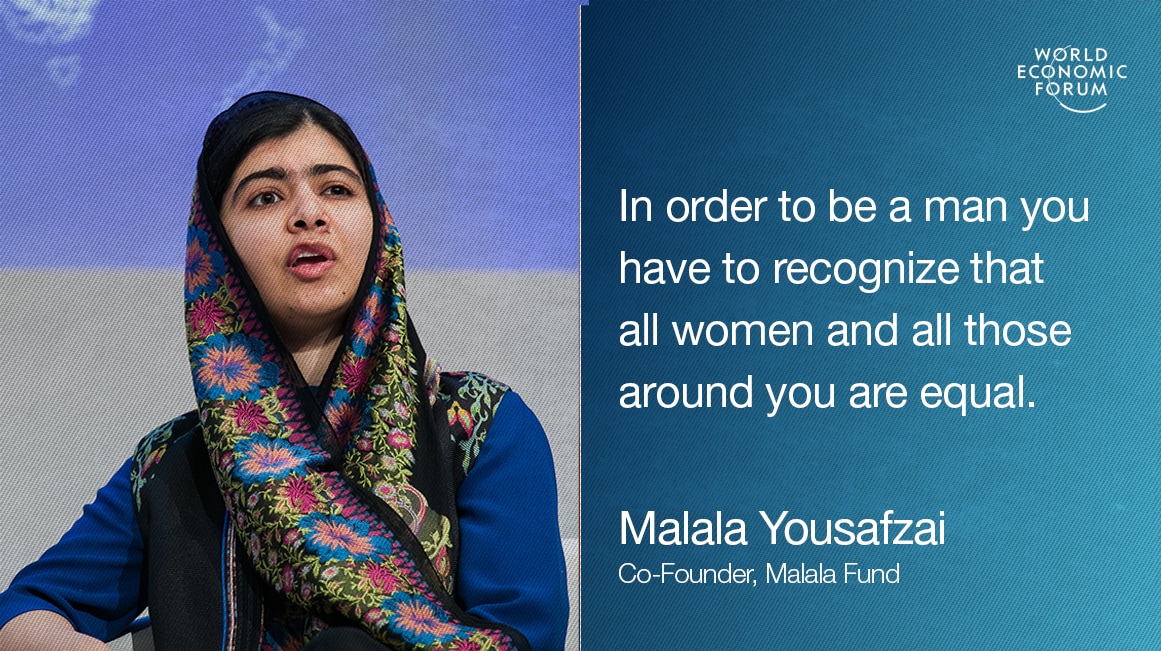Malala in Davos: We need to teach boys to be men

'In order to be a man you have to recognize that all women and all those around you have equal rights' Image: World Economic Forum/JAKOB POLACSEK

Get involved with our crowdsourced digital platform to deliver impact at scale
Stay up to date:
Gender Inequality
The education of young men on the subject of women’s rights is a crucial step to ending gender inequality, Malala Yousafzai said during a session in Davos.
“When we talk about feminism and women’s rights, we’re actually addressing men,” she said.
“Men have a big role to play … We have to teach young boys how to be men. In order to be a man you have to recognize that all women and all those around you have equal rights and that you are part of this movement for equality.”

Five years ago, Malala Yousafzai was shot in the head by the Taliban in her native Pakistan for defying the ban against women going to school. Since then, she’s become the youngest person ever to be awarded the Nobel Peace Prize, written two books and earned a place to study at Oxford University.
In January 2009, when Malala was just 11 years old, the Taliban announced that no girl was allowed to go to school. This was the moment when she realized that education “is about more than reading books and doing homework,” she said. “It’s about the empowerment of women, which the extremists realized before anyone else.
“They knew that women get empowerment through education. There were not against the books and other things, they were actually against women being empowered and women standing equal to men, women doing jobs, women being independent, women making their own decisions. They recognized the importance of women getting an education, which unfortunately many leaders don’t.”
We need more men to think and act like her own father, she said.
“For me, my role model has always been my father. When we talk about feminism in men, he is the example that I give … He was challenging society, he was challenging norms and he was challenging taboos at each and every point in his life … He was a feminist who was taking action, and if he had not allowed me, I would not be here. There were many girls who wanted to speak out, but their parents stopped them.”
Elsewhere during the session, Malala was reminded that she had once said that feminism was a tricky word. What changed?
“I looked more into it and I realized that feminism is just another word for equality, and no one should object to equality … When you speak about women’s rights, you become a feminist, whether you embrace it or not.”
On the current campaigns for women’s rights such as #timesup or #Metoo, she said: “A movement is building up and women are realizing their voices are so important to the change that they want to see. I said long ago during a UN speech that first we wanted men to do something for us, but that time has gone now, we’re not going to ask men to change the world, we’re going to do it ourselves.”
“I can’t send all girls to school, that would be impossible,” Malala went on to say. Educating girls is a collective responsibility, and we all must realize that we have a role to play, including world leaders.
“I haven’t met a single prime minister who would not send their own children to school,” she said. “All of them send their children to school, their children go to university, they do not need any explanation as to how important education is. But when it comes to the rest of the world’s children, they struggle a bit. So you have to keep on reminding them.”

Don't miss any update on this topic
Create a free account and access your personalized content collection with our latest publications and analyses.
License and Republishing
World Economic Forum articles may be republished in accordance with the Creative Commons Attribution-NonCommercial-NoDerivatives 4.0 International Public License, and in accordance with our Terms of Use.
The views expressed in this article are those of the author alone and not the World Economic Forum.
The Agenda Weekly
A weekly update of the most important issues driving the global agenda
You can unsubscribe at any time using the link in our emails. For more details, review our privacy policy.
More on Equity, Diversity and InclusionSee all
Annamaria Lusardi and Andrea Sticha
April 24, 2024
Claude Dyer and Vidhi Bhatia
April 18, 2024
Julie Masiga
April 12, 2024
Alex Edmans
April 12, 2024
John Hope Bryant
April 11, 2024






